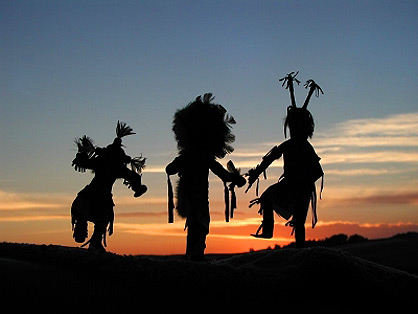Having recently been asked to contribute to “Knowing, Doing,” I decided to take my first post as an opportunity to reflect upon this blog’s title. Although it won’t be anything stellar (and I hope that any potential readers won’t judge my potential future output on the sketchy nature of this posting) I must say, I find the blog’s title suggestive, provocative, and humbling. Its simplicity seems to provoke critical insights: “Knowing, Doing.” It almost sounds like a koan. In fact, the tagline which appears beneath it—“know what you’re doing”—strikes me as a very Zen-like sentiment—and for that reason, a very humbling one. Do we know what we’re doing? Really? No, I think not. But, then again, I must ask, is knowing not a form of doing? If so, then why do we distinguish between “knowing” and “doing”? If “knowing” is a member of the class, “doings,” what is it about the act of “knowing” that makes it irreducible to the order of “doings”? In the answer to this question, I submit, is an important insight into the very nature of being-human—that is, of human doings. Y’know?
Leslie White, an influential anthropologist working in the first half of the twentieth century, often remarked to his students that the ability to distinguish between knowing and doing is what makes us human, and not (just) ape. It is not just a linguistic matter. It is also our capacity to think symbolically. “No ape,” White said, “could ever appreciate the difference between holy water and tap water, because, chemically speaking, there isn’t any.” Culturally speaking, of course, there is all the difference in the world, but apes do not make such distinctions. The ability to posit sacrality is a peculiarly human trait. The ability to make and mark cultural distinctions is distinctive, and perhaps even constitutive, of human nature. It is also the source of a frailty that is specifically human.
Sometimes, we know what we do. Rarely, I think, do we do what we “know.” For instance, everyone who smokes “knows” that it’s not a salubrious habit. Heavy drinkers “know” that consuming more than one alcoholic drink per day may cause health problems, and that drinking more than 14 per week will eventually damage his or her liver irreparably. And everyone who walks into a McDonald’s or a Burger King “knows” that the food they buy there is full of trans-fats, deadly to their heart, and not good for their health and well-being. Yet they still “do” all of these things. Likewise, people who are not terribly active know that they need to exercise in order to maintain health, yet they “do” nothing. Why is this?
To some extent, I believe, it is because most of us can conceive of the Sacred as a possible force in the universe. If we grow up in a culture which posits the existence of non-obvious beings, states, and events—as it seems all cultures, trans-globally and trans-historically, have done—then there is the likelihood that we might believe those beings might give us a “pass,” and protect us from the consequences of our actions. There is also the brute fact of our evolutionary heritage—we survived because we adapted successful means of avoiding nearby threats, but not necessarily of diverting long-term possibilities (the fact that there is very little current concern to change our way of life in the face of impending environmental disaster, but a great deal of concern for making enough money to buy nice things, cars, and clothes for our kids and families, is an illustration of this fact). But mostly, I believe, it is simply the fact that, in our culture, we know too much about ourselves. We know too much about the effects of what we do that the information eventually becomes meaningless.
To illustrate, consider the 2002 film, “About Schmidt,” starring Jack Nicholson. Nicholson plays the part of Warren Schmidt, a recently retired actuary, who worked at an insurance company where he calculated the life expectancies of potential clients. Based upon an assessment of the client’s family history, medical history, and current lifestyle habits, Warren was able to calculate with remarkable accuracy and reliability exactly how long the client is likely to live. For instance, as Warren writes to Ndugu, a young African child that Warren began sponsoring just before his wife died, Warren knows that a widower at his age will likely be dead in the next seven years—provided that he doesn’t remarry! The fact that we know this much about ourselves and of the fragility, and even cold, mathematical predictability, of our time on earth is a frightening thing.
Maybe we’ve gotten too smart for ourselves. Maybe, in pursuing certain kinds of knowing, we have forgotten to think about the consequences of what we are doing. And maybe, with our culture’s valorization of “doing” in service of acquiring and consuming, we forgot to think about what we “know.” And maybe, in the final analysis, this necessity of forgetting is what makes us human. As Nietzsche said, the evolutionary breeding of an animal which could make a promise—a long-term project in service of an as-yet-imaginary goal—required the possibility of forgetting. We must eventually forget the "what-ifs" and focus on the "what-nows." We must pick a goal, not many goals. We must live one life, and try not to dwell or attempt to engage in the endless lives we could have lived. And, I think, that is why our lives are so often tragic: so rarely do we truly know what we’re living: a life of near-endless possibilities, with no re-takes or refunds. We know this, surely.
But is that what we're doing?

1 comment:
I'm reminded of this great book by Michael Tomasello called The Cultural Origins of Human Cognition, when you speak briefly of how cultural distinctions are constitutive of human beingness. Check it out if it ever crosses your path. I really enjoyed it.
http://www.hup.harvard.edu/catalog/TOMCUL.html
Post a Comment